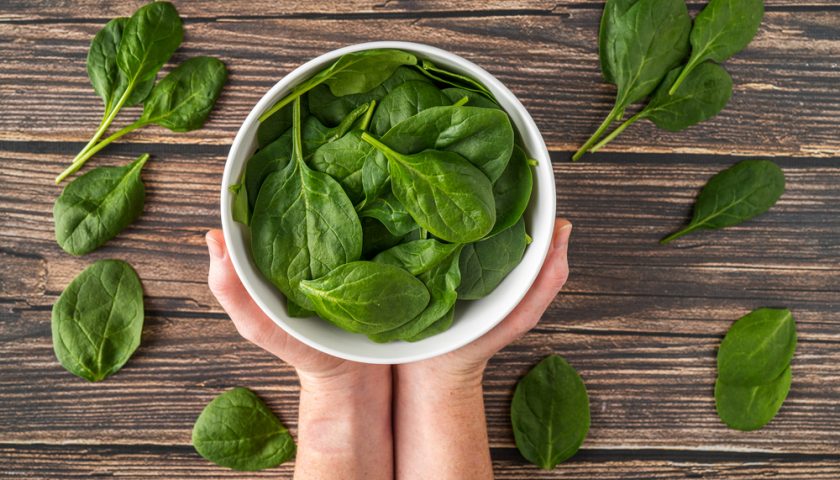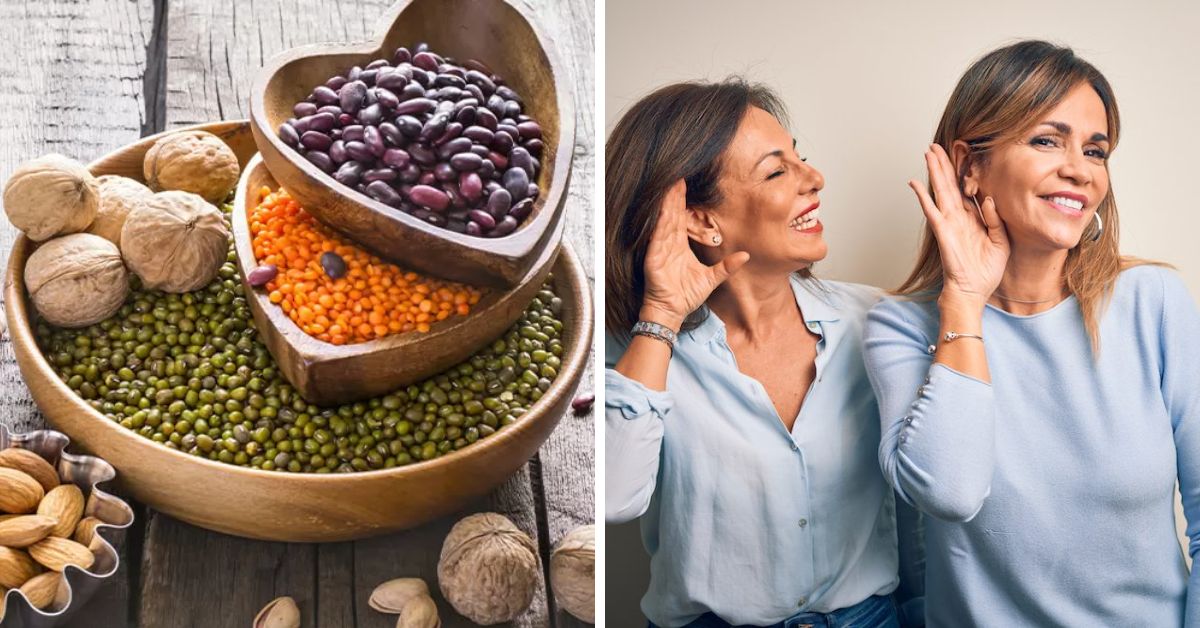Have you ever thought about how your diet affects your hearing? We often see hearing loss as a natural part of aging or from loud noises. But, research shows that what we eat can also play a big role in our hearing health.
Imagine enjoying moments with loved ones for years to come. Eating foods that boost hearing can help protect these special times. Studies in Spain found that eating fruits, veggies, and omega-3s can lower hearing loss risk. Also, a healthy diet, with fish twice a week, greatly reduces hearing problems.
While we can't reverse hearing loss, the right foods can slow it down. Best Foods to Support Healthy Hearing, Foods like bananas, with potassium, improve blood flow in the ear. Leafy greens, with folate and magnesium, protect against noise damage. Whole grains and foods rich in antioxidants also help keep the inner ear healthy.
Your journey to better hearing starts with your next meal. So, why not begin today? Your ears and all the sounds they catch will appreciate it.
Why Diet Matters for Hearing Health?
The link between diet and hearing is stronger than many think. The hair cells in your inner ear need good blood flow and oxygen to work right. Bad nutrition can hurt these cells and affect your hearing.
Research shows that not having enough B12 and folic acid can harm your hearing by up to 39%. But, eating more of these nutrients can protect your hearing by up to 20%. Not having enough folic acid can also cause hearing loss in high frequencies.
Studies at the University of Michigan Kresge Hearing Research Institute found that eating a lot of magnesium and vitamins A, C, and E helps protect against hearing loss from loud noises. Not having enough magnesium can make blood vessels shrink, cutting off oxygen to the inner ear.
Potassium helps keep fluids in balance, which can prevent hearing loss caused by blockages in the ear. Zinc is also key for healthy hearing because not having enough can make you more likely to get ear infections and other viral issues.
Eating foods rich in omega-3 fatty acids can slow down age-related health problems, including hearing loss. A 2014 study found that eating fish at least two times a week can lower the risk of hearing loss in women. Experts also suggest vitamins D and B-12 to help with hearing and keep the immune system strong.
Making sure your diet has these important nutrients can greatly improve your hearing health. A diet focused on these nutrients is key to keeping your hearing sharp and preventing loss.
Fruits Rich in Vitamins and Minerals
Eating a variety of fruits is good for your ear health. Fruits like citrus and berries are full of vitamins and antioxidants. These nutrients support your hearing. Let's see how these fruits can help your ears stay healthy.
Citrus Fruits
Citrus fruits, like oranges, lemons, and grapefruits, are great for your ears. They have folate and vitamins C and A. These are important for good blood flow to your inner ear.
Folate helps make red blood cells, which improves blood flow. This is key for ear health. The citrus benefits for ears don't end there. These fruits also have antioxidants that fight oxidative stress.
Berries
Berries, such as strawberries, blueberries, and raspberries, are full of antioxidants for hearing. These antioxidants help slow down hearing loss by protecting cells from damage. They also reduce inflammation and boost your immunity.
Adding vitamin-rich foods like berries to your diet is important. It helps keep your ears healthy. Including these fruits in your diet is part of a healthy lifestyle.
By eating these fruits every day, you can improve your overall health. Adding them to your diet is a smart choice. It's a way to adopt healthy habits that make life better.
Leafy Green Vegetables for Ear Health

Adding leafy green veggies to your meals can greatly improve your ear health. These foods are packed with vitamins and minerals. They play a big role in keeping your hearing sharp. Let's explore the benefits of spinach, kale, and Swiss chard.
Spinach
Spinach is a nutrient-rich food that's great for your ears. It's full of folate, magnesium, and vitamins like Vitamin E. These nutrients help grow new cells and improve blood flow in the inner ear.
This keeps your auditory system healthy and protects your inner ear hair cells. It's especially helpful in loud environments.
Kale and Swiss Chard
Kale and Swiss chard are also good for your ears. They're rich in folate, iron, and potassium. These nutrients help regulate inner ear fluid and lower the risk of hearing problems caused by anemia.
These veggies also support cellular health. They help prevent infections that can harm your ears.
Eating spinach, kale, and Swiss chard regularly can boost your hearing health. These foods not only protect your ears but also improve your overall health.
Fish: A Source of Omega-3 Fatty Acids
Eating fish is a great way to keep your ears healthy. Fish like salmon, tuna, and herring are full of omega-3 fatty acids. These are good for your hearing.
Salmon
Salmon is a top choice for omega-3. It tastes great and is full of omega-3s. These fats are key for ear health.
They help lower the chance of hearing loss. They support the bones in your ears and keep your hearing paths clear. Eating salmon often is good for your hearing.
Tuna and Herring
Tuna and herring are also great for omega-3s. Canned white tuna has about 0.73 grams of omega-3 per 3-ounce serving. Herring is rich in nutrients and helps your hearing too.
These fish are important for your ear's function. They help keep your hearing sharp. Adding them to your meals is tasty and good for your ears.
Whole Grains for Auditory System Support
Incorporating whole grains into your diet can greatly improve your hearing health. Grains like brown rice, quinoa, and oats are packed with nutrients. They support the auditory system's function.
Whole grains are rich in magnesium, which protects the inner ear's hair cells. These cells are vital for turning sound into electrical signals. A diet with whole grains can shield these cells from loud noises, showing whole grains hearing benefits.
Whole grains also boost blood flow to the ears. This ensures the inner ear gets enough oxygen and nutrients. It helps fight inflammation and lowers the risk of hearing loss.
B-vitamins in whole grains are key for nerve health, including the auditory nerves. Regular whole grain intake supports your auditory system's nerve health and function.
Eating a variety of whole grains is good for your overall health and hearing. A bowl of oatmeal in the morning or quinoa with dinner can help. Make whole grains a key part of your diet for better hearing health.
Natural Remedies for Hearing Loss with Garlic
Garlic is not just for cooking; it's also great for your health, especially your ears. It's known worldwide for its health benefits, including helping with hearing loss.
Garlic helps your ears by improving blood flow. This means your inner ear gets more nutrients and oxygen. This can help you hear better and fight off age-related hearing loss.
Eating garlic regularly can also boost your heart health. This is because it lowers cholesterol and fights inflammation. A healthy heart is linked to better hearing, so it's a win-win.
While some quick fixes claim to fix hearing, garlic is backed by science. It's part of a healthy diet that supports your ears. This shows the value of focusing on overall health, not just quick fixes.
If you want to naturally improve your hearing, try adding garlic to your meals. It's a simple and effective way to keep your ears healthy.
Best Foods to Support Healthy Hearing Naturally

Eating natural foods can greatly help your hearing. These foods give your ears the nutrients they need. Bananas and broccoli are especially good for your ears.
Bananas
Bananas are great for your ears. They're full of potassium, which helps keep your body's fluids balanced. This is key for your ears to work right.
Potassium also helps lower blood pressure. This can make your hearing better and reduce tinnitus. It helps your ears send signals to your brain too.
Broccoli
Broccoli is also good for your ears. It's full of vitamins and minerals like vitamin C and folate. These help protect your hearing.
Broccoli's antioxidants fight off damage in your ears. Folate keeps your blood flowing well. This reduces pressure on your ears and helps your hearing.
Eating bananas and broccoli can help your ears. A diet rich in these foods supports your hearing and overall health.
A Role of Antioxidants in Hearing Health
Millions of people worldwide suffer from hearing loss. A balanced diet rich in antioxidants can help keep your hearing sharp. Antioxidants fight oxidative stress, which harms hearing over time. Eating foods high in antioxidants is a smart way to protect your hearing.
Vitamins C and E are strong antioxidants that shield your ears from damage. Foods with vitamins B9 and B12 help your ears work better by supporting red blood cells. Minerals like magnesium and potassium are also key for ear health. You can find these in berries, nuts, and dark chocolate, making them great for your diet.
Studies have shown that dietary antioxidants are good for your hearing. For example, Le Prell et al. (2011) found that vitamins A, C, and E, along with magnesium, can prevent hearing loss from loud noises. Fetoni et al. (2008) also found that vitamin E protects against hearing damage from loud sounds. These studies highlight the need to eat foods rich in antioxidants to keep your hearing healthy.
Salmon, tuna, leafy greens, and fruits are not just tasty; they're essential for your ear health. Adding regular exercise to your routine also boosts blood flow to your ears. By focusing on these nutrients, you're not just feeding your body. You're also protecting a vital sense that makes life richer and more fulfilling.
Also Read:
Conclusion:
maintaining healthy hearing is closely tied to a well-balanced diet rich in essential nutrients. Foods such as leafy greens, fish, nuts, seeds, and citrus fruits provide vital nutrients like omega-3 fatty acids, antioxidants, zinc, magnesium, and vitamins C and E, all of which support ear health and prevent hearing loss.
Incorporating these foods into your daily meals helps to protect the delicate structures of the inner ear, improve blood circulation, and reduce inflammation. By prioritizing a nutrient-rich diet, you can strengthen your hearing and prevent age-related hearing issues. Additionally, staying hydrated, limiting exposure to loud noises, and avoiding smoking are other key factors in preserving optimal ear function.
Overall, a holistic approach that combines a healthy diet with good lifestyle choices can significantly contribute to long-term hearing health and overall well-being.







